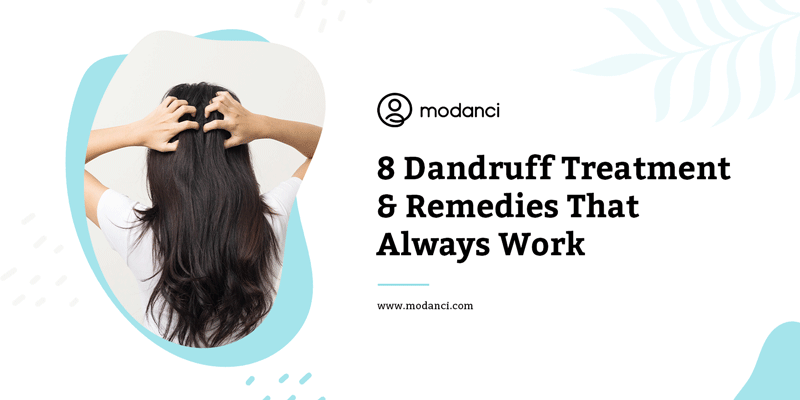Are you tired of those pesky white flakes stealing the spotlight from your fabulous hair? We’ve got you covered! Say goodbye to the embarrassment and discomfort caused by dandruff and hello to a flake-free, confident you. Whether you’ve battled with dandruff for ages or recently noticed its unwelcome arrival, our expert-approved solutions are here to rescue your scalp and restore your hair’s natural beauty.
In this blog, we’re unveiling eight tried-and-true dandruff treatments and remedies guaranteed to work their magic. Get ready to reclaim your crown and flaunt a head of gorgeous, dandruff-free locks with these game-changing treatments and remedies!
What is Dandruff?
Dandruff is a common scalp condition characterised by the shedding of dead skin cells from the scalp. It often leads to the formation of visible white or yellowish flakes that may be accompanied by itching and irritation. While dandruff is not a serious health concern, it can be persistent and bothersome, affecting one’s self-esteem and confidence.
Causes of Dandruff
Have you ever wondered what triggers those pesky flakes on your scalp? From excessive oil production to fungal imbalances and even lifestyle factors, quite a few factors contribute to the formation of dandruff. Understanding these causes is the first step towards effective prevention and treatment.
Here are some primary causes leading to dandruff:
- Excessive oil production: When the scalp produces too much oil (sebum), it can accumulate dead skin cells, resulting in dandruff.
- Malassezia fungus: Malassezia is a yeast-like fungus that naturally resides on the scalp. However, an overgrowth of this fungus can cause irritation and trigger dandruff.
- Dry skin: Dry scalp is a common cause of dandruff. When the skin on the scalp becomes excessively dry, it can lead to flaking and dandruff formation.
- Sensitivity to hair care products: Certain hair care products, such as shampoos, conditioners, or styling products, may contain ingredients that irritate the scalp and contribute to dandruff.
- Skin conditions: Certain skin conditions like seborrheic dermatitis (a chronic inflammatory skin condition) or psoriasis (an autoimmune disease) can cause dandruff.
- Hormonal changes: Hormonal fluctuations, particularly during adolescence, pregnancy, or menopause, can increase the likelihood of dandruff.
- Poor diet and nutrition: A diet lacking essential nutrients, particularly those that promote scalp health, may contribute to dandruff.
- Stress: While not a direct cause, stress can exacerbate existing scalp conditions and potentially lead to dandruff.
8 Natural Treatments and Remedies for Dandruff
Nature holds a treasure trove of solutions that can work wonders for your scalp. From soothing botanicals to nourishing oils and age-old remedies, we’ve handpicked the most potent and proven methods to tackle dandruff head-on. Get ready to restore balance to your scalp, rejuvenate your hair, and regain your confidence!
Here are eight all-natural treatments and remedies that are sure to put an end to those persistent flakes:
1. Tea Tree Oil
Tea tree oil is widely recognised for its antimicrobial and anti-inflammatory properties, making it a popular natural remedy for various skin and scalp conditions, including dandruff. Tea tree oil contains compounds such as terpinene-4-ol, which have been shown to exhibit strong antifungal activity against the yeast-like fungus Malassezia.
When applied topically, tea tree oil helps combat the growth of Malassezia, reducing scalp irritation, itching, and the formation of flakes. Additionally, its anti-inflammatory properties can help soothe an inflamed scalp.
To use tea tree oil for dandruff treatment, it’s important to dilute it with a carrier oil like coconut oil or olive oil to avoid potential skin irritation. Mixing a few drops of tea tree oil with a tablespoon of carrier oil is a common ratio. Gently massage the mixture onto your scalp, ensuring even distribution. Leave it on for 15-20 minutes, allowing the oil to penetrate the scalp. Then, rinse thoroughly and follow up with a mild shampoo.
2. Aloe Vera
Aloe vera gel, derived from the fleshy leaves of the plant, contains a rich blend of vitamins, minerals, enzymes, and amino acids that contribute to its healing properties. It possesses anti-inflammatory, antifungal, and antimicrobial properties, which can help address the underlying causes of dandruff.
When applied to the scalp, aloe vera helps to soothe irritation, reduce inflammation, and promote healing. It moisturises the scalp, preventing dryness and flaking while providing a protective barrier against environmental aggressors. Additionally, aloe vera can help balance the scalp’s pH, creating an inhospitable environment for the growth of dandruff-causing fungi.
Extract the aloe vera gel directly from a fresh leaf or use commercially available aloe vera gel products. Apply the gel directly to your scalp and gently massage it, ensuring even coverage. Leave it on for 30 minutes to an hour to allow the nutrients to penetrate the scalp. Then, rinse thoroughly and follow up with a gentle shampoo.
3. Coconut Oil
Coconut oil contains a unique combination of fatty acids, including lauric acid, capric acid, and caprylic acid. These fatty acids possess antimicrobial properties that help combat fungal and bacterial infections on the scalp, often associated with dandruff. It also has a soothing effect on the scalp, alleviating itchiness and irritation. It can help reduce inflammation and redness, providing relief from the discomfort.
When applied to the scalp, coconut oil forms a protective barrier that helps retain moisture, preventing dryness and flaking. It nourishes the scalp and hair follicles, promoting a healthy scalp environment and reducing the likelihood of dandruff formation.
To use coconut oil, gently warm it to liquefy it, if necessary. Then, apply it to your scalp and hair, massaging it using circular motions. Make sure to cover the entire scalp and focus on the areas where dandruff is most prevalent. Leave the coconut oil on for at least 30 minutes to an hour to allow it to penetrate the scalp and nourish the hair. You can even leave it on overnight for a more intensive treatment by wearing a shower cap. Finally, rinse thoroughly and shampoo your hair as usual.
4. Apple Cider Vinegar
The acidic nature of apple cider vinegar helps restore the pH balance of the scalp, which factors like dandruff-causing fungi or excessive oil production can disrupt. Restoring the pH balance helps create an unfavourable environment for the growth of fungi and promotes a healthier scalp. It also possesses antimicrobial properties that help combat fungal and bacterial infections on the scalp.
When applied to the scalp, apple cider vinegar can help remove excess oil, dirt, and product buildup. It acts as a natural clarifying agent, unclogging hair follicles and improving scalp health.
Create a diluted solution by mixing equal parts of apple cider vinegar and water. After shampooing your hair, apply the diluted apple cider vinegar solution to your scalp, focusing on the areas affected by dandruff. Gently massage it into your scalp and leave it on for a few minutes before rinsing thoroughly with water. It’s important to dilute the vinegar to avoid potential scalp irritation.
5. Lemon Juice
Lemons are rich in citric acid, vitamin C, antioxidants, and natural acids that contribute to their potential effectiveness in addressing scalp issues. The acidic nature of lemon juice helps restore the scalp’s pH balance. By restoring the pH balance, lemon juice creates an environment that is less favourable for the growth of fungi, reducing the likelihood of dandruff.
It also possesses antimicrobial properties that help combat fungal and bacterial infections on the scalp. The natural acids in lemon juice have a cleansing effect, helping to remove excess oil, dirt, and product buildup. It acts as a natural exfoliant, aiding in removing dead skin cells from the scalp.
Squeeze fresh lemon juice and apply it directly to your scalp. Gently massage the juice into your scalp, focusing on the areas affected by dandruff. Leave it on for a few minutes to allow the lemon juice to work its magic, then rinse thoroughly with water. It’s important to note that lemon juice can cause stinging or irritation on open wounds or sensitive skin, so it’s best to dilute it with water if you have any concerns.
6. Neem Oil
Neem oil is rich in beneficial compounds such as nimbin, nimbidin, and azadirachtin, contributing to its therapeutic properties. It possesses powerful antimicrobial, antifungal, and anti-inflammatory properties, making it an effective option for combating dandruff. It helps eliminate dandruff’s underlying causes by targeting fungal infections, reducing inflammation, and soothing the scalp.
The antifungal properties of neem oil help control fungi’s overgrowth, including the yeast-like fungus Malassezia. Its anti-inflammatory properties can help soothe an inflamed or irritated scalp. It can help alleviate itching, redness, and discomfort.
Mix a few drops of neem oil with a carrier oil such as coconut oil or olive oil. Carrier oils help dilute the concentrated neem oil and make it easier to apply. Gently massage the mixture into your scalp, focusing on the areas affected by dandruff. Leave it on for at least 30 minutes or overnight for better results, and then wash your hair with a mild shampoo.
7. Baking Soda
Baking soda, or sodium bicarbonate, is a common household ingredient that can be used as a natural remedy for dandruff. It has exfoliating properties that help remove dead skin cells and reduce flakes. Baking soda also helps balance the pH level of the scalp, which can discourage the growth of dandruff-causing fungi.
Wet your hair and scalp, then rub a handful of baking soda onto your scalp, focusing on the areas affected by dandruff. Gently massage for a few minutes, then rinse thoroughly. You can follow up with a mild shampoo and conditioner. Start with this treatment once a week and adjust the frequency based on your scalp’s response.
8. Fenugreek Seeds
Fenugreek seeds, also known as methi seeds, have anti-inflammatory and soothing properties that help alleviate scalp irritation and itchiness. They can relieve the discomfort caused by dandruff flakes and reduce redness and inflammation on the scalp. They possess antifungal properties that can combat the overgrowth of the yeast-like fungus.
Soak two tablespoons of fenugreek seeds in water overnight. In the morning, grind the soaked seeds into a paste. Apply the paste to your scalp and leave it on for about 30 minutes. Rinse it off with water and mild shampoo. Fenugreek seeds can also be combined with other natural ingredients like yoghurt, lemon juice, or coconut oil to enhance their effectiveness in combating dandruff and nourishing the scalp.
Conclusion
Dandruff can be an annoying and persistent scalp condition that affects many individuals. While it may seem challenging to get rid of those pesky flakes, numerous natural treatments and remedies are available to help you combat dandruff effectively. Remember, consistency is key when using natural remedies, so be patient and give them time to work their magic.
Embrace a holistic approach to scalp care, maintain a healthy lifestyle, and experiment with different remedies to find what works best. With the right combination of natural treatments and remedies, you can bid farewell to dandruff and say hello to a healthy, itch-free scalp. Don’t let dandruff hold you back! Embrace these natural solutions and regain your confidence with a revitalised, dandruff-free mane.
Modanci’s Potensified Hair Oil helps combat hair-related issues like dandruff and hair loss. Answer a few questions and get a personalised solution that nourishes your hair from within!
FAQs
1. What causes dandruff in hair?
Dandruff is primarily caused by a combination of factors, including an overgrowth of a yeast-like fungus called Malassezia, excessive oil production, dry skin, sensitivity to hair care products, and certain medical conditions.
2. Can lemon remove dandruff?
Yes, lemon can help remove dandruff. Its acidic properties can help balance the scalp’s pH level and reduce the fungus’s growth that contributes to dandruff. Lemon juice can also help eliminate excess oil, soothe itchiness, and provide a refreshing sensation to the scalp.
3. Is dandruff harmful to hair?
Dandruff itself is not harmful to hair. It is a common scalp condition characterised by flaking of the skin. However, if left untreated, dandruff can lead to scalp itching, irritation, and inflammation, which may cause temporary hair loss or thinning. Additionally, scratching the scalp excessively due to dandruff can damage the hair follicles.
4. Which is the best shampoo for dandruff?
When choosing a dandruff shampoo, consider your hair type and any sensitivities or allergies you may have, and follow the instructions provided. It’s also recommended to consult with an Ayurvedic physician for personalised advice and recommendations based on your specific needs.
Read More:




